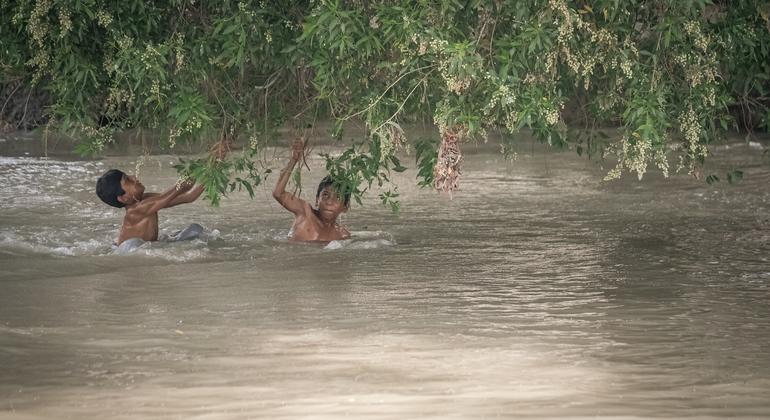Sure! Here’s the translated text in American English:
—
The heavy monsoon rains in Pakistan have triggered an unprecedented humanitarian crisis, claiming the lives of at least 739 people since late June. This weather phenomenon has displaced thousands of citizens and devastated homes and crops in various regions of the country, creating a catastrophic landscape. Forecasts indicate that bad weather will continue in the coming weeks, increasing the risk of further floods and landslides, according to UN agencies and local authorities.
The National Disaster Management Authority of Pakistan has reported around 978 injuries, along with damage recorded in more than 2,400 homes and the loss of over 1,000 livestock as of August 21. Khyber Pakhtunkhwa is the hardest-hit province, where states of emergency have been declared in nine districts due to torrential rains occurring between August 15 and 19, which resulted in 368 deaths and the destruction of nearly 100 schools.
In the town of Buner, teams from the international charity CARE have documented the total devastation of homes and livelihoods at critical moments, swept away by torrents of water laden with debris. Children are one of the most vulnerable groups in this crisis, facing uprooting and loss of access to education, in addition to a shortage of drinking water. Since August 15, at least 21 children have reportedly died due to the flooding in Khyber Pakhtunkhwa, while many schools have become unusable or have been occupied as temporary shelters.
In the city of Karachi, the capital of Sindh, the rains on August 19 caused urban flooding that left at least six fatalities and wreaked havoc on infrastructure, with rainfall of up to 145 millimeters in some areas, flooding streets and leaving neighborhoods without electricity.
In response to this emergency, authorities have deployed over 2,000 people to carry out rescue and evacuation efforts. In collaboration with the United Nations, essential supplies such as food, medical items, and tents have been distributed to affected areas. The UN Office for the Coordination of Humanitarian Affairs has activated emergency protocols, sending response teams to the hardest-hit districts.
Additionally, UNICEF has contributed medical supplies and hygiene kits for the affected communities, each of which includes soap and water containers in an effort to prevent the spread of diseases during this crisis.
Pakistan, which has faced disastrous monsoon seasons in recent years, saw historic floods in 2022 that caused over 1,700 deaths and displaced millions, with economic losses estimated at $40 billion. This pattern of erratic rainfall, exacerbated by climate change, worsens conditions and threatens not only the country’s recovery but also the stability of the entire South Asian region.
—
Feel free to ask if you need any more help!
via: MiMub in Spanish











